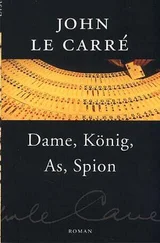John le Carr� - Tinker Tailor Soldier Spy
Здесь есть возможность читать онлайн «John le Carr� - Tinker Tailor Soldier Spy» весь текст электронной книги совершенно бесплатно (целиком полную версию без сокращений). В некоторых случаях можно слушать аудио, скачать через торрент в формате fb2 и присутствует краткое содержание. Жанр: Триллер, на английском языке. Описание произведения, (предисловие) а так же отзывы посетителей доступны на портале библиотеки ЛибКат.
- Название:Tinker Tailor Soldier Spy
- Автор:
- Жанр:
- Год:неизвестен
- ISBN:нет данных
- Рейтинг книги:3 / 5. Голосов: 1
-
Избранное:Добавить в избранное
- Отзывы:
-
Ваша оценка:
- 60
- 1
- 2
- 3
- 4
- 5
Tinker Tailor Soldier Spy: краткое содержание, описание и аннотация
Предлагаем к чтению аннотацию, описание, краткое содержание или предисловие (зависит от того, что написал сам автор книги «Tinker Tailor Soldier Spy»). Если вы не нашли необходимую информацию о книге — напишите в комментариях, мы постараемся отыскать её.
Tinker Tailor Soldier Spy — читать онлайн бесплатно полную книгу (весь текст) целиком
Ниже представлен текст книги, разбитый по страницам. Система сохранения места последней прочитанной страницы, позволяет с удобством читать онлайн бесплатно книгу «Tinker Tailor Soldier Spy», без необходимости каждый раз заново искать на чём Вы остановились. Поставьте закладку, и сможете в любой момент перейти на страницу, на которой закончили чтение.
Интервал:
Закладка:
Breakfast again and a much subdued Welshman not drawn by undercooked sausage and overcooked tomato.
'Do you want these back,' Lacon demanded, 'or have you done with them? They can't be very enlightening since they don't even contain the reports.'
'Tonight, please, if you don't mind.'
'I suppose you realise you look a wreck.'
He didn't realise, but at Bywater Street when he returned there Ann's pretty gilt mirror showed his eyes red-rimmed and his plump cheeks clawed with fatigue. He slept a little, then went his mysterious ways. When evening came Lacon was actually waiting for him. Smiley went straight on with his reading.
For six weeks, according to the files, the naval despatch had no successor. Other sections of the Ministry of Defence echoed the Admiralty's enthusiasm for the original despatch, the Foreign Office remarked that 'this document sheds an extraordinary sidelight on Soviet aggressive thinking', whatever that meant; Alleline persisted in his demands for special handling of the material but he was like a general with no army. Lacon referred frostily to 'the somewhat delayed follow-up', and suggested to his Minister that he should 'defuse the situation with the Admiralty'. From Control, according to the file, nothing. Perhaps he was lying low and praying it would blow over. In the lull a Treasury Moscow-gazer sourly pointed out that Whitehall had seen plenty of this in recent years: an encouraging first report, then silence, or, worse, a scandal.
He was wrong. In the seventh week Alleline announced publication of three new Witchcraft reports all on the same day. All took the form of secret Soviet interdepartmental correspondence, though the topics differed widely.
Witchcraft No. 2, according to Lacon's summary, described tensions inside Comecon and spoke of the
degenerative effect of Western trade deals on its weaker members. In Circus terms, this was a classic report from Roy Bland territory, covering the very target which the Hungarian-based Aggravate network had been attacking in vain for years. 'Excellent tour d'horizon ,' wrote a Foreign Office customer, 'and backed by good collateral.'
Witchcraft No. 3 discussed revisionism in Hungary and Radar's renewed purges in political and academic life: the best way to end loose talk in Hungary, said the author of the paper, borrowing a phrase coined by Khrushchev long before, would be to shoot some more intellectuals. Once again this was Roy Bland territory. 'A salutary warning,' wrote the same Foreign Office commentator, 'to all those who like to think the Soviet Union is going soft on satellites.'
These two reports were both in essence background, but Witchcraft No. 4 was sixty pages long and held by the customers to be unique. It was an immensely technical Soviet Foreign Service appreciation of the advantages and disadvantages of negotiating with a weakened American president. The conclusion, on balance, was that by throwing the President a bone for his own electorate, the Soviet Union could buy useful concessions in forthcoming discussions on multiple nuclear warheads. But it seriously questioned the desirability of allowing the United States to feel too much the loser, since this could tempt the Pentagon into a retributive or pre-emptive strike. The report was from the very heart of Bill Haydon territory. But as Haydon himself wrote in a touching minute to Alleline - promptly copied without Haydon's knowledge to the Minister and entered on the Cabinet Office file - in twenty-five years of attacking the Soviet nuclear target he had not laid his hands on anything of this quality.
'Nor,' he concluded, 'unless I am extremely mistaken, have our American brothers-in-arms. I know that these are early days, but it does occur to me that anyone taking this material to Washington could drive a very hard bargain in return. Indeed, if Merlin maintains the standard, I would venture to predict that we could buy anything there is to have in the American agency's shop.'
Percy Alleline had his reading room; and George Smiley made himself a coffee on the derelict burner beside the washstand. Midway the meter ran out and in a temper he called for Norman and ordered five pounds' worth of shillings.
CHAPTER SEVENTEEN
With mounting interest Smiley continued his journey through Lacon's meagre records from that first meeting of protagonists until the present day. At the time, such a mood of suspicion had gripped the Circus that even between Smiley and Control the subject of Source Merlin became taboo. Alleline brought up the Witchcraft reports and waited in the anteroom while the mothers took them to Control, who signed them at once in order to demonstrate that he had not read them. Alleline took back the file, poked his head round Smiley's door, grunted a greeting, and clumped down the staircase. Bland kept his distance, and even Bill Haydon's breezy visits, traditionally a part of the life up there, of the talking shop which Control in the old days had liked to foster among his senior lieutenants, became fewer and shorter, then ceased entirely.
'Control's going potty,' Haydon told Smiley with contempt. 'And if I'm not mistaken he's also dying. It's just a question of which gets him first.'
The customary Tuesday meetings were discontinued, and Smiley found himself constantly harassed by Control either to go abroad on some blurred errand, or to visit the domestic outstations - Sarratt, Brixton, Acton and the rest - as his personal envoy. He had a growing feeling that Control wanted him out of the way. When they talked, he felt the heavy strain of suspicion between them, so that even Smiley seriously wondered whether Bill was right and Control was unfit for his job.
The Cabinet Office files made it clear that those next three months saw a steady flowering of the Witchcraft operation, without any help from Control. Reports came in at the rate of two or even three a month and the standard, according to the customers, continued excellent, but Control's name was seldom mentioned and he was never invited to comment. Occasionally the evaluators produced quibbles. More often they complained that corroboration was not possible since Merlin took them into uncharted areas: could we not ask the Americans to check? We could not, said the Minister. Not yet, said Alleline; who in a confidential minute seen by no one, added: 'When the time is ripe we shall do more than barter our material for theirs. We are not interested in a one-time deal. Our task is to establish Merlin's track record beyond all doubt. When that is done, Haydon can go to market...'
There was no longer any question of it. Among the chosen few who were admitted to the chambers of the Adriatic Working Party, Merlin was already a winner. His material was accurate, often other sources confirmed it retrospectively. A Witchcraft committee formed with the Minister in the chair. Alleline was vice-chairman. Merlin had become an industry, and Control was not even employed. Which was why in desperation he had sent out Smiley with his beggar's bowl: 'There are three of them and Alleline,' he said. 'Sweat them, George. Tempt them, bully them, give them whatever they eat.'
Of those meetings also, the files were blessedly ignorant, for they belonged in the worst rooms of Smiley's memory. He had known already by then that there was nothing in Control's larder that would satisfy their hunger.
It was April. Smiley had come back from Portugal, where he had been burying a scandal, to find Control living under siege. Files lay strewn over the floor; new locks had been fitted to the windows. He had put the tea cosy over his one telephone and from the ceiling hung a baffler against electronic eavesdropping, a thing like an electric fan which constantly varied its pitch. In the three weeks Smiley had been away, Control had become an old man.
Читать дальшеИнтервал:
Закладка:
Похожие книги на «Tinker Tailor Soldier Spy»
Представляем Вашему вниманию похожие книги на «Tinker Tailor Soldier Spy» списком для выбора. Мы отобрали схожую по названию и смыслу литературу в надежде предоставить читателям больше вариантов отыскать новые, интересные, ещё непрочитанные произведения.
Обсуждение, отзывы о книге «Tinker Tailor Soldier Spy» и просто собственные мнения читателей. Оставьте ваши комментарии, напишите, что Вы думаете о произведении, его смысле или главных героях. Укажите что конкретно понравилось, а что нет, и почему Вы так считаете.









